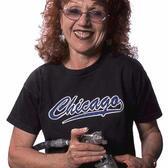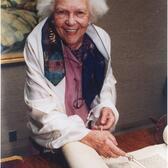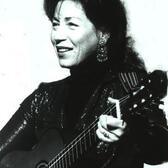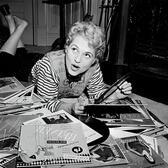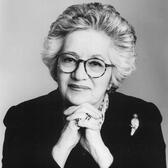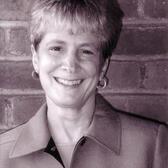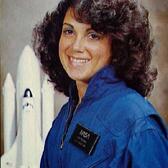December: Judith - Some Highlighted Judiths
Judith Baskin
In the introduction to her 1991 edited volume Jewish Women in Historical Perspective, (Second Edition, 1998) Judith Baskin writes that she sees her work as contributing to a "general knowledge of the diversity and richness of Jewish women's pasts." To those ends, she compiled a curriculum guide entitled Gender and Jewish Studies in 1994. She is Knight Professor of Humanities and Director of the Harold Schnitzer Family Program at the University of Oregon. Focusing in her research on Jewish women in rabbinic tradition and medieval civilization, she authored Pharaoh's Counselors: Job, Jethro, and Balaam in Rabbinic and Patristic Tradition and Midrashic Women: Formations of the Feminine in Rabbinic Literature (2002) and edited Women of the Word: Jewish Women and Jewish Writing (1994). She also edited The Cambridge Dictionary of Jewish History, Religion, and Culture (2008). Baskin is an Honorary Director of the Association for Jewish Studies and served as its president from 2004 to 2007.
[Top]
Judith Belasco
Judith Belasco was born in Edgemont, New York, in 1978. She lives in Brooklyn, New York, and works for Hazon, a Jewish environmental organization committed to building a healthier, more sustainable world. Judith oversees Hazon’s popular annual Food Conference, supervises the Hazon blog The Jew & the Carrot, and runs the Community Supported Agriculture (CSA) program. CSAs let members buy their food directly from the farmers that grow it, instead of from the store. In addition to focusing on how food is grown, Judith helps people think about how we eat our food and encourages families to eat more meals together at home.
[Top]
Judy (Sussman) Blume
Characterized by total empathy with the concerns of childhood, emotional and sexual candor, and a direct colloquial tone, Judy Blume's books have sold over 75 million copies. She has said that she relies on "total recall" to project herself back into certain stages of her life. Remembering the questions and emotions of her own youth, she attempts to show young readers that they are not alone in their fears and confusion. In 1986, Blume published an anthology of letters she had received from readers called Letters to Judy: What Your Kids Wish They Could Tell You as an attempt to help parents see life through their children's eyes. Blume also established the KIDS Fund in 1981 to develop programs that encourage communication between parents and teens and that foster parent-child discussion through books. Blume continues to publish in the field of children's literature. [More: Encyclopedia, This Week in History]
[Top]
Judith Chapman
A lifelong activist to in her native San Francisco, Judy Chapman worked tirelessly and passionately to establish "room at the top" for women. Throughout her volunteer career, which included service on the boards of the Jewish Community Relations Council, the Jewish Federation, as secretary of the local Democratic Party, and as President of the board of the Jewish Community Bulletin, Judy was an outspoken advocate for equality of power. She mentored countless women and steered them into positions of leadership. Her influence was so great that when she died in 1997, friends and colleagues honored her by establishing the Judith Chapman Memorial Women's Leadership Fund. The Fund's proceeds are utilized to provide leadership skills training for women.
[Top]
Judy (Cohen) Chicago
For three decades, Judy Chicago has fused politics with art through painting, sculpture, writing, and teaching. Examining what it meant to be both a woman and an artist, and wanting to aid other women in their artistic journeys, Chicago developed the Fresno Feminist Art program at California State University in 1970. Disturbed by history's neglect of women, Chicago collaborated with hundreds of volunteers to create The Dinner Party—a controversial installation using highly sexual imagery to commemorate individual women, which is permanently on view as the centerpiece of the Elizabeth A. Sackler Center for Feminist Art at the Brooklyn Museum. Chicago's exploration of notions of power, masculinity, and femininity has led to work on childbirth, the Holocaust, and the Jewish concept of tikkun olam —the healing of the world. [More: Encyclopedia, Jewish Women and the Feminist Revolution, This Week in History]
[Top]
Judith Kaplan Eisenstein
Before she was thirteen years old, author, composer, and musicologist Judith Kaplan Eisenstein was already a significant figure in Jewish history. The oldest of four daughters born to Lena (Rubin) and Rabbi Mordechai Menachem Kaplan, the founder of Reconstructionist Judaism, Judith was the first young woman to celebrate a bat mitzvah in America. Intellectually precocious, Judith learned to read by the time she was two and went on to study music at the Julliard School; she also attended the Jewish Theological Seminary Teacher Institute as well as Columbia University Teachers College, where she received her BS (1928) and MA (1932). At the age of fifty-seven, she received her Ph.D. in music history. Judith spent her life teaching music pedagogy and the history of Jewish music, as well as publishing Jewish songbooks and cantatas. [More: Encyclopedia, This Week in History, JWA Blog]
[Top]
Judith Laikin Elkin
An expert on Latin American Jewry, Judith Elkin spent the Columbus Quincentary Year directing a series of conferences funded by the National Endowment for the Humanities on the theme "Jews and the Encounter with the New World 1492/1992" and also as consulting historian on the pictorial exhibit on Jewish Life in Latin America and the Caribbean. Elkin is a professor emeritus of the Frankel Center for Judaic Studies at the University of Michigan and founding president of the Latin American Jewish Studies Association. She has published widely on Latin American Jewry, and has been a longtime editor of the journal Latin American Jewish Studies. In her autobiography Krishna Smiled, she recounts her adventures and travels as a U.S. Foreign Services Officer in Asia, Europe, and South America.
[Top]
Judith G. Epstein
Deeply committed to the establishment and development of the State of Israel, Judith Epstein dedicated her career as a social and political activist to Hadassah, the Women's Zionist Organization of America. She attended several meetings of the World Zionist Congress and was also Hadassah's representative to the United Nations. She was largely responsible for funding the Rothschild-Hadassah-University Hospital in Jerusalem. For her commitment to Israel, Hadassah established an endowment and memorial award in her name. [More: Encyclopedia]
[Top]
Judy Frankel
Judy Frankel, an acclaimed singer of Judeo-Spanish (Ladino) music, passed away in 2008. After moving to the Bay Area in 1969, Frankel sang with many small and large ensembles, including the San Francisco Symphony Chorus, and was a soloist with several groups, among them the San Francisco Consort. As a solo performer, she sang not only the Ladino / Judeo-Spanish songs she was known for, but also songs in Yiddish, Hebrew, and some 20 other languages. She garnered appreciative comments on her good pronunciation. Frankel understood that traditional singing is really only properly learned from traditional singers. She worked with Sephardic women to learn their style, which she then made her own. [More: We Remember]
[Top]
Judith Ginsberg
A world traveler, conversant in Romance languages, Judith Ginsberg earned her Ph.D. in Spanish literature and was a professor of Spanish at Union College. From there, Ginsberg moved into a career in educational programming and curriculum development for the National Endowment for the Humanities and the Modern Language Association. Beginning in 1990 she served the education community in another capacity as founding Executive Director of The Covenant Foundation, where she implemented all aspects of the Foundation's awards and grants and established the Foundation's presence in Jewish philanthropy. Ginsberg is currently the Executive Director for the Nash Family Foundation in New York. Ginsberg gives her spare time to board positions in several organizations, including the Resources for Children with Special Needs.
[Top]
Judith Hauptman
E. Billi Ivry Professor of Talmud and Rabbinic Culture at the Jewish Theological Seminary of America, Dr. Judith Rebecca Hauptman received her B.A. in economics from Barnard College, her B.A. of Hebrew Literature and Talmud from the Seminary College of Jewish Studies, and her M.A. and Ph.D. in Talmud from the Jewish Theological Seminary. Dr. Hauptman has served as Visiting Professor of Talmud at City College of New York, as Visiting Instructor and as Assistant Professor of Talmud at Hebrew Union College, and as a Visiting Associate Professor of Talmud in the Seminario Rabinico Latinamericano, in Buenos Aires. Dr. Hauptman has written extensively on issues of Talmudic Law and on women's issues in Rabbinic and modern Judaism. Among her numerous publications are two books published in 1998: Development of the Talmudic Sugya: Relationship of Tannaitic and Amoraic Sources and Rereading the Rabbis, A Woman's Voice.
[Top]
Judith Helfand
An independent filmmaker, community activist, cancer survivor, and labor historian, Helfand grew up in Nassau County, Long Island, which has one of the highest DES exposure rates in the country. She uses personal narrative to document her own struggle with DES-related cervical cancer in her film, A Healthy Baby Girl. Her film premiered in January 1998 at the Sundance Film Festival in Park City, Utah and was one of ten independent non-fiction films chosen out of hundreds to be in the P.O.V. series on PBS. Helfand aimed A Healthy Baby Girl to attract a diverse following of supporters: organizers against toxic substances, environmental policy activists, labor unionists, women's health advocates, and Jews probing the spiritual responsibility of tikkun olam, or repair of the earth.
[Top]
Judith Herman
A leading authority on domestic violence, Dr. Judith L. Herman is the director of training for the Victims of Violence Program at the Cambridge Hospital in Cambridge, Massachusetts, a Professor of Clinical Psychiatry at Harvard Medical School, and a founding member of the Women's Mental Health Collective in Somerville, Massachusetts. She is the author of Father-Daughter Incest and Trauma and Recovery, which the New York Times hailed as among the most important psychiatric works of our time. In 2000 she was awarded the Woman in Science Award for "exceptional contributions to medical science, especially in women's health" by the American Medical Women's Association.
[Top]
Judy Holliday
After she left her native Manhattan for California, the film studio insisted that Judy Tuvim—then twenty-two years old—choose a stage name. She chose the English translation of the Hebrew word for tuvim, holiday, but after several failed attempts to make movies in Hollywood, she traveled back east and won a few roles in the theater in the 1940s. She was repeatedly refused the screen role of a part she had managed beautifully on stage—Billy Dawn, the chorus girl in Born Yesterday—because she was "too Jewish." She eventually won an Oscar (1950) for this role and later a Tony Award for The Bells Are Ringing (1957). In 1952, she was interviewed by the Senate Subcommittee as part of the McCarthy hearings and was partially blacklisted as a result. Her awards marked the culmination of her successes on stage and screen. [More: Encyclopedia, This Week in History]
[Top]
Judith Hurwich
An inspiring teacher with a zest for learning, Judith Hurwich was a passionate advocate for the education of women in all fields of Jewish knowledge. An avid and eclectic reader and a lifelong learner, she dedicated her boundless energy to facilitating learning and educational opportunities for others. When she moved with her family from New York to Jerusalem, Hurwich immediately made her home a "salon" where Jerusalemites and visitors from around the world would come anticipating lively and engaged conversation about politics, arts and letters, and Judaism. She eventually transformed these afternoon and evening conversations into ongoing study groups, which, in turn, became the foundation for one of the premier women's institutes of Jewish study in Israel: MATAN.
[Top]
Judith Kabalkin
Natives of Lithuania, Judith Kabalkin and her husband Jacob followed his father to Manchuria at the end of the 19th century. Serving as emissary of the Russian czar to oversee the laying of the trans-Siberian railway, the elder Kabalkin pioneered the formation of the Jewish community in both Harbin and Shanghai. The family served as communal leaders for over 50 years. When her husband and father-in-law left the czar's service to form what became the largest soybean export company in the world, Judith devoted considerable energy to ensuring that western culture and education find their way into her family's life. A pianist and singer, Judith performed and taught music in the "Russian" community in China. She was the first teacher of noted violinist Yasha Heifetz, and she is said to have inspired his passion to pursue a musical career. When Japan occupied and conquered Manchuria, the Kabalkin family lost everything. Judith fled to the United States and died in Seattle, Washington in 1941.
[Top]
Judith Kates
To her colleagues and friends, Judith Kates serves as a model student and teacher. After earning her Ph.D. in Comparative Literature at Harvard, she taught there for seven years. During that time, she started participating in a weekly Torah discussion group, an experience that opened the Torah to her as an adult learner. In 1985, when she left Harvard and dedicated herself to Jewish learning, she began her second career. Currently a Professor of Jewish Women's Studies at Hebrew College in Brookline, Massachusetts, Kates now teaches Jewish texts in institutional and private adult learning communities. Her students praise the "spiritual home" she creates in these communities, where students can question the texts as she continues to do. Kates has published in the areas of Renaissance Studies, Women's Studies, and Jewish Studies and has co-edited (with Gail Reimer) Reading Ruth: Contemporary Women Reclaim a Sacred Story and Beginning Anew: A Women's Companion to the High Holy Days.
[Top]
Judith (Smith) Kaye
After being considered for the positions of U.S. attorney general and Supreme Court justice, Judith Kaye chose to be sworn in as chief judge of the state of New York, the first woman to serve in the state's highest judiciary office. The longest-serving chief judge in the state's history, Kaye stepped down at the end of 2008, having reached the mandatory retirement age of 70. She has held positions in organizations that focus on domestic violence and breast cancer, served on the board of the Legal Aid Society, and has brought child-care to courthouses. As a trial lawyer, a state justice, and as chief judge of the New York State Court of Appeals, Kaye has worked to make the court system become "more responsive to the needs of modern society." Kaye and her family are long-standing members of the Sephardic Congregation Shearith Israel in New York City. [More: Encyclopedia, This Week in History]
[Top]
Judith Kerman
In 1971, Judith Kerman founded Earth's Daughters, which is thought to be the oldest American feminist literary magazine still publishing. She has written numerous books of poetry and translated works by Latin American poets. As publisher and editor of Mayapple Press, Kerman is active in publishing the works of other poets. She also pioneered computer-based poetry in the mid-1980s. Kerman is professor of English at Saginaw Valley State University in Michigan, and formerly served as the University's Dean of Arts and Sciences.
[Top]
Judith (Tarcher) Krantz
Best-selling author Judith Krantz has written ten novels that draw on her knowledge of fashion, fame and Hollywood to create plots and subplots about high-powered women, beauty, fame, money, and sex. After graduating from Wellesley College in 1948, she became a fashion publicist in Paris and went on to be the fashion editor for Good Housekeeping magazine. She has also been a contributing writer to McCall's magazine and Ladies Home Journal, and an editor of Cosmopolitan magazine. Her autobiography titled Sex and Shopping: The Confessions of a Nice Jewish Girl was published in 2000. [More: Encyclopedia]
[Top]
Judith Krug
Judith Krug, a champion of free speech, passed away in 2009. When she established the Freedom to Read Foundation in 1969, she based the organization's mission firmly on the First Amendment. She worked tirelessly on legal battles; her triumphs included the Supreme Court’s 1997 decision to overturn the Communications Decency Act. Krug had an innate talent for defusing controversy: "She invented what they now call media training," said Art Plotnik, former editor of American Libraries. Krug was a First Amendment purist. Despite being a liberal Democrat in her personal political leanings, she was aware that threats to free speech came from both ends of the political spectrum. [More: We Remember]
[Top]
Judy (Myers) Langenthal
Judy Langenthal credits her mother, the late Molly Myers, with establishing a steadfast pattern of commitment to tzedakah and community service—a commitment that Langenthal has emulated. Langenthal fondly recalls walking the streets of Baltimore's Jewish neighborhoods with her mother, knocking on doors to ask for donations to the kupat cholim, the community fund, of the Associated Jewish Charities. Langenthal managed to merge two passions—Jewish continuity and the arts-through her work at the Jewish Museum of Maryland, formerly the Maryland Jewish Historical Society, where she served as Board President.
[Top]
Judith (Peto) Leiber
Born in Budapest, Hungary, Judith Leiber was accepted to King's College, Cambridge to study chemistry, but was unable to attend because of travel restrictions on Jews. Instead, Leiber enrolled in the Hungarian Handbag Guild and eventually went on to design handbags synonymous with fashion savvy, indulgence, and wealth. At the encouragement of her husband Gerson Leiber, she began her own handbag company in 1963. Today, Leiber designs are in the permanent collections of museums around the country and she has received numerous business, fashion, and design awards. [More: Encyclopedia, This Week in History]
[Top]
Judith Weinshall Liberman
Judith Weinsall Liberman has had a long career as a visual artist, writer, and playwright. Born in Palestine, she came to the U.S. to study in 1947 and only found her way to art in the mid 1960s. Since then, her work has been exhibited in museums and other public institutions in the United States and in Israel. In 2002, she published a book of reproductions and writings of one of her major works, The Holocaust Wall Hangings (2002), and in 2007 an autobiography, My Life Into Art. A collection of her plays, Looking Back (2010) includes "Good Old Abraham," which was performed by the Shades Repertory Theater in Haverstraw Village, New York, in April 2010. Liberman's papers are in the Smithsonian Archives of American Art and the Fine Arts Department of the Boston Public Library. For further info, visit Judith Weinshall Liberman's website.
[Top]
Judith Lichtman
At the 25th anniversary luncheon of the National Partnership for Women and Families, President Bill Clinton called Judith Lichtman "a remarkable national treasure" for her work as president of the organization. Lichtman's commitment, vision, and talent as an attorney and an advocate have made a profound difference for women and families across the United States. She has worked for the Urban Coalition, the U.S. Commission on Civil Rights, and she has served as legal advisor to the Commonwealth of Puerto Rico. In 1974, she became the executive director and first paid staff person at the Women's Legal Defense Fund (which became the National Partnership for Women and Families in 1998). Her public work has brought her many honors including the Sara Lee Frontrunner Award, the Martin Luther King Jr. Civil Rights Leadership award, and the Washington Bar Association's Thurgood Marshall Award.
[Top]
Judith Malina
Personifying the 1960s countercultural challenge to traditionalism, self-proclaimed anarchist and pacifist Judith Malina likened herself to a biblical prophet, railing at but never dissociating herself from her people. Malina founded the experimental Living Theater with Julian Beck, which aimed at dissolving the separation between actor and character, cast and audience, art and politics. She taught at New York University and Columbia University, and appeared on the Molly Goldberg series and in such movies as Enemies: A Love Story, Dog Day Afternoon, and The Addams Family. [More: Encyclopedia, This Week in History]
[Top]
Judy Meltzer
What comprises an academic curriculum? Judy Meltzer has devoted her career to answering this question. As Dean of Undergraduate Studies and of the Stulman School of Continuing Education at the Baltimore Hebrew University for twelve years, Meltzer introduced a diverse range of course work to the institution. In her effort to expose students to the broad spectrum of Jewish knowledge and culture, she has taught Yiddish cinema, Jewish comedy, American Jewish history; she was an early proponent of featuring Jewish women's studies as a credible and creditable subject. Winner of the United Synagogue of America Award for Adult Jewish Education of the Seaboard Region in 1988, Meltzer is currently the Director of the Stulman Center for Adult Learning at the Chizuk Amuno Congregation in Baltimore, MD.
[Top]
Judith Montell
Judith Montell has produced and directed award-winning documentaries dealing with issues of social justice, history, and education. Montell's films have received numerous honors, including an Academy Award Nomination in the category of Outstanding Achievement, Documentary Feature, and they have been shown at film festivals around the globe including the Festival International du Film Documentaire in Switzerland, the Sundance Film Festival, and the Vienna Film Festival. [More: Encyclopedia]
[Top]
Judy Nieto
A farmer, raised as Christian, from the only Jewish family in her county of 900 in the Texas panhandle, Judy Nieto has encountered frequent anti-Semitism. She says, "When I was younger, I felt I was a Texan first, American second, and Jewish third. When I grew up and traveled outside of Texas, I became an American first and a Jew second. Then, I had children and became a Jew first. My religion teaches my children right from wrong, decent from indecent, moral from immoral, and just from unjust. . . . Any day in my life I could choose not to live as a Jew to make our lives easier. But I've never been willing to make that choice."
[Top]
Judith Obermayer
Judith Obermayer developed a new interest in genealogy after traveling to Lithuania and Belarus with her husband to explore their genealogical roots. In a small town three hours' drive from Vilnius, she discovered the grave of her great grandfather, and in Minsk she traced her family back to her great great grandparents. Professionally, she serves as director and treasurer of the Commonwealth Enterprise Fund, where she helps small companies develop business plans and specifically works to target women and minority entrepreneurs for capital to support their businesses. She was a founder and is currently Co-Chair of the Black Jewish Economic Roundtable (a project of the AJC), and on the Board of Directors of the Jewish Vocational Service and The Shefa Fund, a national organization that supports progressive social action including community economic development investment and responsible shareholder activism. She holds a B.S. degree from Carnegie-Mellon and a Ph.D. in mathematics from Harvard University.
[Top]
Judith Stern Peck
As the founder of JSP Associates, a firm designed to provide educational and consultation services to family businesses and family foundations, Judith Stern Peck has offered a unique service to those grappling with family matters in their corporate and philanthropic endeavors. She has brought her extensive experience as a family therapist and asset manager into a growing arena. Her book Money and Meaning: New Ways to Have Conversations about Money with Your Clients—A Guide for Therapists, Coaches, and Other Professionals was published in 2007. A longtime volunteer and leader in the New York Jewish Community, Peck served as Chair of the Board of the New York UJA-Federation, the second woman to hold this position. She has served as President of B'nai Jeshurun Congregation, the Board of Overseers of the Rabbinical School at the Jewish Theological Seminary, among many other leadership roles. Her firm belief that women can create momentum for change led her to take an active role in the Dialogue Project, a group of American Jewish and Palestinian women leaders who have met since 1989 to help move the Middle East peace process forward.
[Top]
Judith Plaskow
"The project of creating a feminist Judaism," Judith Plaskow wrote in her 1990 work Standing Again at Sinai, "means re-forming every aspect of tradition so that it incorporates women's experiences." A professor of religious studies at Manhattan College, Plaskow lectures both in the United States and in Europe on this task of re-forming, as well as on the broader topics of feminism and theology. She has authored three books, co-edited three others, and has published numerous articles in edited volumes and journals. Plaskow co-founded The Journal of Feminist Studies in Religion and she is past president of the American Academy of Religion. She sees her struggle for the creation of a feminist Judaism "as part of a larger struggle for a more just world." [More: Encyclopedia, Jewish Women and the Feminist Revolution, Go & Learn]
[Top]
Judith Graham Pool
A physiologist trained at the University of Chicago, Judith Pool revolutionized the field of research on blood disease. She discovered a technique that made the treatment for hemophilia easier than ever before, and the National Hemophilia Foundation renamed its research fellowship after her. Pool also worked to develop techniques to measure the electric potential of a single muscle fiber, and her findings are utilized all over the world. Because of her valuable contributions, she soared through the ranks at Stanford University to go from a research associate in 1956 to a full professor in 1972. In her later years, Pool devoted much time and effort to increasing opportunities for women in the field of science, both by publishing articles on the topic and by serving as co-President of the Association for Women in Science and as the first chairwoman of Professional Women of Stanford University Medical Center. [More: Encyclopedia]
[Top]
Judith Resnik
Though she wanted to be known as "just another astronaut," Judith Resnik was the second American woman—and the first Jewish woman—to travel in outer space. Showing talents early in science and math, Resnik earned a perfect score on her college entrance exam and went on to train as an electrical engineer at Carnegie Mellon. After earning her doctorate in 1979, she stunned her friends by applying to NASA where she felt she could do "something that really mattered." Resnik was known by her fellow crew members aboard the 1984 space shuttle Discovery as a perfectionist and a true professional. Two years later, she and her six colleagues died in the tragic explosion of the space shuttle Challenger. [More: Encyclopedia, This Week In History]
[Top]
Judy (Waxman) Robins
Judy Robins' zest for life and dedication to excellence serve as an example of Judaism's mandate that we live each day to the fullest. With boundless energy, she has served the Jewish community in Denver in virtually every capacity, including that of Federation Campaign Chair. She acts on her belief that every day is a gift requiring unselfish action, which inspired her peers to honor her with the prestigious Golda Meir Award. Her sense that women must have a seat at the communal table motivated her to become a founding member of the United Jewish Appeal's Young Women's Cabinet in 1976. Judy's fundamental belief that aesthetics is a vital part of life has propelled her highly successful career as an interior designer and contemporary art collector and consultant. Beloved by her clients and peers, Judy brings a sense of celebration to her work, her personal life and her extensive volunteer agenda.
[Top]
Judith Rodin
The first woman to head any Ivy League institution, Judith Rodin served for ten years as President of her alma mater, the University of Pennsylvania. Trained as a research psychologist, Rodin was a longtime professor at Yale University in both the School of Arts and Sciences and the School of Medicine before returning to Penn, and made important contributions to the field of behavioral medicine with research focusing on the complex relationships between mind and body. In addition to countless honors and awards in science, she has been widely published as author or co-author of books, chapters of books, and hundreds of journal articles. Her book The University and Urban Revival: Out of the Ivory Tower and into the Community recounts her nationally-recognized initiatives to transform the West Philadelphia neighborhood while Penn's President. Rodin served as a member of President Clinton's Committee of Advisors on Science and Technology. In 2005 she was named president of the Rockefeller Foundation.
[Top]
Yehudit Shadur
Renowned Jerusalem artist Yehudit Shadur has been one of the primary forces behind the revival of the traditional folk art of papercutting as a form of contemporary Jewish expression. A native of Milwaukee, Shadur made aliyah to Israel in 1950, living on a frontier kibbutz with her husband and young children. As a young art instructor at Kibbutz Sde Boker, Shadur created her first papercut as a sukkah decoration in honor of the 80th birthday of Israel's prime minister, David Ben Gurion. Encouraged by the depth of his response to her work, Shadur spent many hours honing her skills as a papercutter, studying the typical motifs of traditional Jewish folk art, and experimenting with innovative subject matter, techniques, and imagery. She has since authored award-winning books on the tradition of Jewish papercuts with her husband, Joseph Shadur. Through her art, lectures, published research, and many exhibitions in the United States and Israel, Shadur has been the seminal force inspiring a new generation of Jewish papercutters and reviving a once forgotten form of Jewish expression.
[Top]
Judith Shapiro
From 1994 to 2008 Judith Shapiro served as president of Barnard College. Shapiro was the first woman appointed to the department of anthropology at the University of Chicago, and she subsequently rose up the academic ranks at Bryn Mawr College, where she began as an assistant professor of anthropology and eventually became department chair and then college provost. She researches in the areas of gender differentiation and social theory. Shapiro has been on the board of or advised many professional organizations and foundations, specifically in the areas of women's colleges, foreign relations, and the city of New York. [More: This Week In History]
[Top]
Judith Vladeck
Judith Vladeck was a distinguished civil rights lawyer and a partner at Vladeck, Waldman, Elias and Engelhard in New York for 50 years. Vladeck received her BA from Hunter College, and her JD from Columbia University. She specialized in labor law, representing unions and employees against large companies, and was best known for her victories in landmark sex discrimination cases. Only a decade after the passage of the Civil Rights Act in 1964, she negotiated a multimillion-dollar settlement for women professors at the City University of New York by using the salary history of 5,000 employees to prove that women had faced discrimination in pay for 15 years. Vladeck received many professional awards for her pioneering work and was honored by Non-Traditional Employment for Women (NEW), an organization she had represented, with the naming of their headquarters as The Judith P. Vladeck Center for Women.
[Top]

